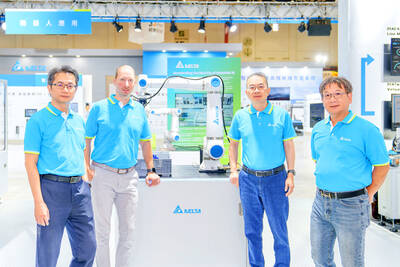DBS Bank (星展銀行) yesterday launched a new credit card called the “Everyday Card,” which allows cardholders to earn one reward point for every NT$5 spent on dining or at wholesale markets, movie theaters, gas stations, book stores and digital stores.
After launching two credit cards, the “Travel Card” and “Live Fresh Card,” which provide flight mileage rewards and cash rebates, in June and August respectively, the bank said that it now aims to pursue consumers who want to collect credit points and spend them on goods or services.
The bank said its points have a lifetime validity.

Photo courtesy of DBS Bank
Even though many credit cards offer a reward program, “the reward points are often valid for two or three years, which cardholders dislike,” DBS Bank executive director Calvin Lin (林群凱) said, citing MasterCard Inc data.
Given that daily consumption accounts for 42 percent of all credit card use in the nation, the Everyday Card gives better rewards on purchases in the six categories, Lin said, adding that the “consumer’s desire is our desire.”
Cardholders can also earn credit points for every NT$25 they spend in other categories, the bank said.
Even though banks are facing tough competition in Taiwan, “it is hard to find the same reward as our one point for every NT$5 spent,” DBS general manager Lim Him-chuan (林鑫川) said.
The new card rewards spending at all restaurants and beverage stores, “as we found out that credit card consumption on dining has jumped 17 percent in Taiwan over the past six years, which is higher than average consumption,” Lin said, adding that the bank hopes to increase total consumption.
“DBS has its credit card strategy and every credit card has different rewards for cardholders,” Lim said, adding that if one bank issues too many cards without distinct characteristics, it is hard to manage and consumers are likely to become confused about which one to choose.
The number of cards the Singaporean bank has in circulation in Taiwan hit 676,784 as of the end of last month, ranking it second among foreign banks, DBS said yesterday.
The bank said that it hopes to issue more than 10,000 Everyday Cards within a month.

SETBACK: Apple’s India iPhone push has been disrupted after Foxconn recalled hundreds of Chinese engineers, amid Beijing’s attempts to curb tech transfers Apple Inc assembly partner Hon Hai Precision Industry Co (鴻海精密), also known internationally as Foxconn Technology Group (富士康科技集團), has recalled about 300 Chinese engineers from a factory in India, the latest setback for the iPhone maker’s push to rapidly expand in the country. The extraction of Chinese workers from the factory of Yuzhan Technology (India) Private Ltd, a Hon Hai component unit, in southern Tamil Nadu state, is the second such move in a few months. The company has started flying in Taiwanese engineers to replace staff leaving, people familiar with the matter said, asking not to be named, as the

The prices of gasoline and diesel at domestic fuel stations are to rise NT$0.1 and NT$0.4 per liter this week respectively, after international crude oil prices rose last week, CPC Corp, Taiwan (台灣中油) and Formosa Petrochemical Corp (台塑石化) announced yesterday. Effective today, gasoline prices at CPC and Formosa stations are to rise to NT$27.3, NT$28.8 and NT$30.8 per liter for 92, 95 and 98-octane unleaded gasoline respectively, the companies said in separate statements. The price of premium diesel is to rise to NT$26.2 per liter at CPC stations and NT$26 at Formosa pumps, they said. The announcements came after international crude oil prices

STABLE DEMAND: Delta supplies US clients in the aerospace, defense and machinery segments, and expects second-half sales to be similar to the first half Delta Electronics Inc (台達電) expects its US automation business to remain steady in the second half, with no signs of weakening client demand. With demand from US clients remaining solid, its performance in the second half is expected to be similar to that of the first half, Andy Liu (劉佳容), general manager of the company’s industrial automation business group, said on the sidelines of the Taiwan Automation Intelligence and Robot Show in Taipei on Wednesday. The company earlier reported that revenue from its automation business grew 7 percent year-on-year to NT$27.22 billion (US$889.98 million) in the first half, accounting for 11 percent

A German company is putting used electric vehicle batteries to new use by stacking them into fridge-size units that homes and businesses can use to store their excess solar and wind energy. This week, the company Voltfang — which means “catching volts” — opened its first industrial site in Aachen, Germany, near the Belgian and Dutch borders. With about 100 staff, Voltfang says it is the biggest facility of its kind in Europe in the budding sector of refurbishing lithium-ion batteries. Its CEO David Oudsandji hopes it would help Europe’s biggest economy ween itself off fossil fuels and increasingly rely on climate-friendly renewables. While